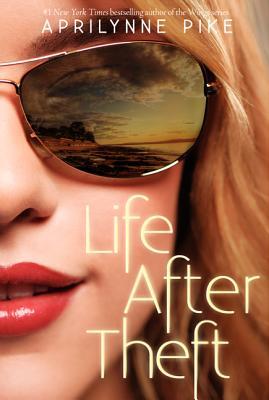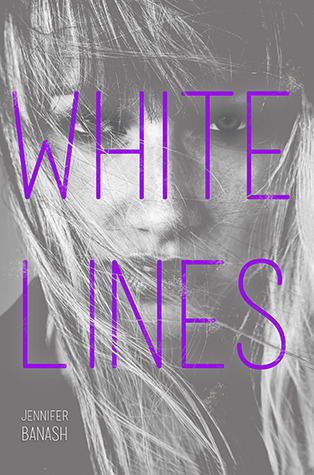Synopsis from Goodreads:
Moving to a new high
school sucks. Especially a rich-kid private school. With uniforms. But
nothing is worse than finding out the first girl you meet is dead. And a
klepto.
No one can see or hear Kimberlee except Jeff, so--in hopes of bringing an end to the snarkiest haunting in history--he agrees to help her complete her "unfinished business." But when the enmity between Kimberlee and Jeff's new crush, Sera, manages to continue posthumously, Jeff wonders if he's made the right choice.
No one can see or hear Kimberlee except Jeff, so--in hopes of bringing an end to the snarkiest haunting in history--he agrees to help her complete her "unfinished business." But when the enmity between Kimberlee and Jeff's new crush, Sera, manages to continue posthumously, Jeff wonders if he's made the right choice.
Lynne's Review:
To
begin with, this book has a really interesting and fun premise. We have
Kimberlee, a kleptomaniac dead girl stuck in a limbo of remorse
purgatory - she was a mean girl and bully in life and she continues to
be a mean girl in her after life. She's often selfish and bratty and
bitchy.
Years ago, my Mom taught me a saying: that sometimes people who need love the very most ask for it in the most unloving way.. turns out I've met a lot of people like that in real life and I believe this was ultimately the case in Kimberlee's character.
And then there is Jeff, the new guy in town and it's his first day in his new high school and he's struggling to not be all goofy and awkward or get laughed at.
He's a good guy, sweet, tends to do the right thing -even if doing the right thing means also breaking the law or taking the fall. He is also the only person alive who has been able to able to see or communicate with Kimberlee since the accident that caused her death just over a year ago.
Right now she's a ghost and using Jeff to return the stolen items may be her only chance to clear up the unfinished business that must be keeping her from moving on. from the looks of it though she has a lot to be sorry for and a lot to do to make things right so she can finally move into the light, cross over the bridge or, whatever. But being the nice guy and even knowing he probably shouldn't get involved, Jeff helps her .. often going above and beyond the call of duty, even where ghosty friends are concerned.
The plot moves along at a nice pace even if it's a little predictable, but it does delve deeper with some real life teen/high school issues and there are definitely some nice twists to figure out.
Of course, it's going to take far more than returning a few things, turns out there is SO MUCH MORE for Kimberlee and Jeff to discover and learn about each other and themselves before they make a difference. There is a sweet and surprising depth to these kids.
I loved the easy banter between the two main characters with their laugh out loud sarcasm and wit. The descriptive writing made it easy to imagine Kimberlee haunting Jeff, sinking through the seat of his car or walking eerily through walls as well as through people in the school hallways. She was always popping up, surprising him when he least expected it and sometimes at the worst possible moments.
I could easily see this book being made into an after school special sort of show. I believe it would translate well to screen and I think high schoolers would relate to it.
Overall I enjoyed reading Life After Theft and would recommend it to ages young adult on up. It was a great book that would make for fun weekend read
**I won this ARC / Uncorrected Proof edition in a GoodReads first-reads giveaway.
Thank you Goodreads and Harper Teen (at http://harperteen.com) for this opportunity to review this book.
Years ago, my Mom taught me a saying: that sometimes people who need love the very most ask for it in the most unloving way.. turns out I've met a lot of people like that in real life and I believe this was ultimately the case in Kimberlee's character.
And then there is Jeff, the new guy in town and it's his first day in his new high school and he's struggling to not be all goofy and awkward or get laughed at.
He's a good guy, sweet, tends to do the right thing -even if doing the right thing means also breaking the law or taking the fall. He is also the only person alive who has been able to able to see or communicate with Kimberlee since the accident that caused her death just over a year ago.
Right now she's a ghost and using Jeff to return the stolen items may be her only chance to clear up the unfinished business that must be keeping her from moving on. from the looks of it though she has a lot to be sorry for and a lot to do to make things right so she can finally move into the light, cross over the bridge or, whatever. But being the nice guy and even knowing he probably shouldn't get involved, Jeff helps her .. often going above and beyond the call of duty, even where ghosty friends are concerned.
The plot moves along at a nice pace even if it's a little predictable, but it does delve deeper with some real life teen/high school issues and there are definitely some nice twists to figure out.
Of course, it's going to take far more than returning a few things, turns out there is SO MUCH MORE for Kimberlee and Jeff to discover and learn about each other and themselves before they make a difference. There is a sweet and surprising depth to these kids.
I loved the easy banter between the two main characters with their laugh out loud sarcasm and wit. The descriptive writing made it easy to imagine Kimberlee haunting Jeff, sinking through the seat of his car or walking eerily through walls as well as through people in the school hallways. She was always popping up, surprising him when he least expected it and sometimes at the worst possible moments.
I could easily see this book being made into an after school special sort of show. I believe it would translate well to screen and I think high schoolers would relate to it.
Overall I enjoyed reading Life After Theft and would recommend it to ages young adult on up. It was a great book that would make for fun weekend read
**I won this ARC / Uncorrected Proof edition in a GoodReads first-reads giveaway.
Thank you Goodreads and Harper Teen (at http://harperteen.com) for this opportunity to review this book.
rating: 4 stars










